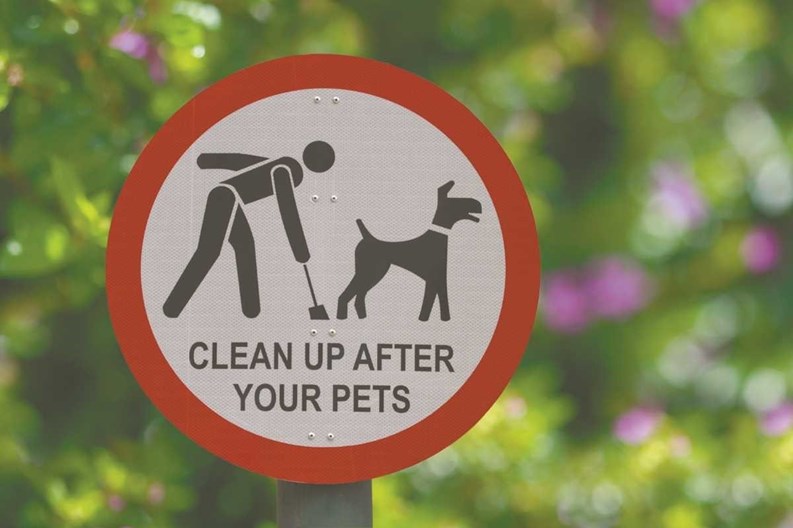In the 1960s, people would laugh at the notion that someone could make money by going to people’s houses and asking to mow their lawn. This was something that everyone did themselves and the thought of paying someone else to do it seemed ridiculous.
Fast forward 50 years and that same ridicule is happening to some innovative thinkers who have started their own pet waste management companies. Seriously, are people really paying money for others to clean up after their dogs? The answer is a resounding “Yes!”
“A service like mine is a nice thing to offer people at a dog-friendly condo,” says Brian Woodard, owner of Kanine Kleenup, which offers regularly scheduled cleanup services to dog owners in southern Massachusetts and northern Rhode Island. “Everyone has a busy lifestyle and doesn’t always have time to do it. Especially this time of year when it gets dark early, it just makes it harder to do it.”
For anyone who lives in a pet-friendly condominium and has stepped in the not-so-friendly droppings of their neighbor’s dog on their grass, driveway or sidewalk, these companies are a god-send.
“It is certainly a large and prevalent problem for condo communities,” says Gary Daddario, an attorney with the law firm of Perkins & Anctil in Westford, Massachusetts. “By and large, the non-pet owners at a condo consider it a grave offense when they are exposed to the pet waste of the other owners.”
Not Just the Shoes
There is nothing more frustrating to responsible pet owners who faithfully pick up after their dogs, than to walk out their front door and see a pile.
Sure, everyone knows what stepping in dog waste can do to a pair of shoes, but the damage done by uncurbed pets is much more serious than people think. Besides the general grossness, dog poo can cause the death of plants and trees, erosion, and the staining of brick. It can also create safety and health hazards.
According to Anthony Gillis, president of Zerowaste.usa.com, which offers green pet waste solutions, one average sized pile of doggie doo can produce three billion bacteria. Plus, roundworm eggs can survive in the soil of your property for years and disease can pass from these hazardous piles to both humans and other pets.
“Dog waste is a major pollutant and contaminant of the water supply. It is a serious health issue,” Gillis says. “It is estimated that one-third of all water contamination is a result of dog waste runoff entering streams and leaching into underground well water. The average dog can produce 274 pounds of waste each year.”
According to the U.S. Centers for Disease Control and Prevention (CDC), pet waste can contribute to diseases that animals pass to humans, called zoonoses. When infected waste is deposited on the ground, the eggs of certain roundworms and other parasites can linger in the soil for years. Anyone, especially dogs, coming into contact with that soil — whether through gardening, playing sports, walking barefoot or any other means— runs the risk of coming into contact with the eggs.
For the Dogs
With more and more communities becoming pet-friendly and initiating services to attract those with dogs, dealing with pet waste is gaining ground as an issue.
“I don’t think either side of the debate at the condos has concerned themselves much with the city/town regulations. Reason being, most condos have fairly specific requirements for the pets and it always includes picking up any waste,” Daddario says. “Sometimes, you might see a condo communicate a violation to an owner and they will add in the fact that the misconduct is also a violation of municipal regulations. However, for the most part, that doesn’t alter the interaction or resolution between the condo owner and the condo board.”
Most communities put up signs around the building and around the grounds as reminders, and regulations about cleanup are usually in the house rules, but that’s not always enough.
“Even though the law requires dog owners to clean up after their pets, not all dog owners are responsible or community-minded,” Gillis says. “By providing a highly visible system, communities can create a prominent awareness of each dog owner’s responsibility and produce greater compliance.”
Some condo communities provide baggies and sanitary containers; others offer designated dog-walking areas.
“Dog owners are more likely to clean up after their pets if they are provided with dog waste bags and waste containers,” Gillis says. “Owners will feel more responsible if a system is provided and they realize someone is monitoring. It becomes socially unacceptable for a pet owner to allow their dog to soil the grounds when a convenient pick-up bag and trash container is provided.”
According to the experts, the best dog waste stations and dispensers are made of aluminum, which last longer and withstand daily use better than poly resin or plastic units.
It’s also far less expensive to provide waste bags and waste containers than it is to clean up soiled areas, handle resident complaints regarding soiled grounds and deal with local, state or federal violations.
Service with a Smile
Woodard’s business isn’t the only company in New England that works with community associations to handle dog waste, and new entries into the market seem to come every few months.
“Dogs poop and people don’t want to pick it up so I’m a very convenient service for a lot of people,” he says. “It helps the cleanliness of the place, helps the health of the dogs and people and can attract people to the condo itself.”
Annette Kuhn, owner of Poop, Scoop & Away, LLC in Bedford, New Hampshire, has been working with community associations for years.
“Even though some residents are responsible for their dogs every time, other residents may look upon those people with animosity or resentment just because they have a dog, and question whether or not they pick up after them every time since they’ve either stepped in ‘a gift’ or just have seen it on the property not being taken care of,” Kuhn says. “To eliminate the frustration that can overcome a multi-dwelling community when it comes to picking up after residents’ dogs, we are glad to assist in alleviating these issues and help with creating harmony between the dog and non-dog owners.”
The cost for such a service isn’t as high as you might think.
“I’ve spoken to a couple of condos about them adding a couple dollars more in rent each month, and that’s more than enough for someone to come through and do it,” Woodard says. “It’s something that really can add a lot of value to a community.”
CSI for Dogs
It may be hard to believe, but one way condos are fighting back against residents who don’t curb their dog is through the use of DNA testing. If you are a property owner or property manager, there is no question that you have been frustrated and disgusted by piles of doggie doo left on your property and you have most likely been equally frustrated that you have had no way to prove who the irresponsible resident is.
A news item in January reported that officials at a downtown Orlando condo complex are going to start testing feces to find out who is not cleaning up after their dog. The Vue hired PooPrints, a Tennessee-based company that will take DNA samples from the HOA’s dogs, which are put into a global registry, and then will be used to track down owners when they don't pick up after their pets. The condo said it expects to have all the DNA samples collected during the month. Violators could face a $100 fine. A Plano, Texas apartment complex also hired the same company in January to test its resident pooches. They plan to fine violators $250 for non-compliance.
Debbie Logan, manager of Twin Ponds at Nashua in Nashua, New Hampshire, has been managing that property for 14 years and takes pride in providing a safe and healthy environment for the residents and their pets.
“Twin Ponds is a beautiful property consisting of 375 apartments and almost 400 dogs,” she says. “At first, dog waste was an enormous problem. Piles upon piles. I couldn’t believe how bad it was in certain areas. You could certainly tell it was a few select individuals and not everyone being irresponsible.”
Knowing that there must be a solution, Logan also discovered PooPrints and reached out to them for their service.
“I initially thought it was crazy. I thought, ‘Okay, property managers wear many hats, but what is this? Doggie CSI?’” she says. “A simple cheek swab of all our dogs now creates a DNA database in the World Pet Registry. Samples left on the property are sent to the lab and provide a match using that DNA.”
The process is simple. One swab is “swooshed” around in the left cheek for 10 seconds, then one in the right cheek, and they are mailed into the lab and registered by use of a barcode. All owners—new and old—are required to register their dogs.
“When they come to sign their lease, we are swabbing the dogs. If the dogs are not with them, they do not move in,” Logan says. “If you already live here and want a new puppy, we’re all for it. You simply call within 48 hours and make the appointment to swab the dog. We only charge a one-time fee of $50 per dog and have no pet security or additional monthly pet fees.”
Now, when residents find a pile on the property they notify management so they can go gather a sample to send into the lab.
“We aren’t spending time scaling the property to look for the problem anymore, mostly because it does not exist anymore,” Logan says. “Our residents love the program and they are glad to help us. The responsible dog owners want to catch the irresponsible dog owners just about as much as we do.”
Everyone benefits from the program. Residents enjoy healthy clean grounds, property managers are not wasting time trying to figure out who is causing the problem, maintenance men are not being asked to clean up after someone else and landscapers can landscape without stepping in a mess.
Money Matters
For any rule to work there have to be consequences or else violators won’t take it seriously. Logan says that her community imposes fines on anyone who goes against the rule.
“No exceptions, no excuses,” Logan says. “First and second offense are $100, third offense is $200, fourth offense is $300, etc. If they do not pay their fines, we would move forward with eviction, although we have never had to do this. We’ve collected all our fines.”
Logan charges residents $30 for the kit and another $50 for registering, but properties can choose to charge what they see is reasonable.
“The property does not pay a dime for the program. In fact, the property even makes money, which we put towards the cost of our dog bags that we supply at the dog stations scattered around the property,” she says. “Imagine that the property owner is not paying a thing to keep the property clean. I love that the program is affordable to the pet owner too. It is a misconception that anything having to do with DNA is costly. There literally is not another program out there that does what this one does for properties and the residents. It’s a total win-win.”
Keith Loria is a freelance writer and a frequent contributor to New England Condominium.







Comments
Leave a Comment